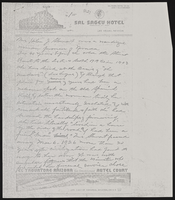Search the Special Collections and Archives Portal
Search Results
Wilma Noyes oral history interview
Identifier
Abstract
Oral history interview with Wilma Noyes conducted by Claytee D. White on April 11, 2007 for the Boyer Early Las Vegas Oral History Project. In this interview, Noyes discusses her personal history and life in Las Vegas, Nevada from the 1920s onward. She describes moving to Las Vegas with her family in 1921 after her father got a job working for Union Pacific Railroad Company. Noyes explains how the railroad provided housing to its workers and what life was like in that housing. Noyes discusses attending the first schools in Las Vegas, one of them having had Maude Frazier as its principal. Noyes then describes what young people did for entertainment in Las Vegas, including dancing and going to movie theaters. Lastly, she discusses the history of the casinos and how the city has changed.
Archival Collection
Lovey McCurdy oral history interview
Identifier
Abstract
Oral history interview with Lovey McCurdy conducted by Greg McCurdy on March 19, 1981 for the Ralph Roske Oral History Project on Early Las Vegas. Lovey recalls arriving in Las Vegas, Nevada in 1951, meeting white people in Las Vegas, Nevada, the atomic bomb testing, and other aspects of being part of the African American community during the 1950s and 1960s.
Archival Collection
Pete Berger oral history interview
Identifier
Abstract
Oral history interview with Pete Berger conducted by David Schwartz on June 14, 2019 for the Boyer Early Las Vegas Oral History Project. In this interview, Pete Berger discusses arriving to Las Vegas, Nevada in 1955 after serving in the United States Air Force in California. He talks about his career working as a pit boss at over a dozen Las Vegas casinos , other positions he held, and the people he met throughout his career.
Archival Collection
Charles Adams oral history interview
Identifier
Abstract
Oral history interview with Charles Adams conducted by Mike Lommori on February 28, 1980 for the Ralph Roske Oral History Project on Early Las Vegas. In this interview, Adams discusses the changes in Southern Nevada over the previous twenty years. The two discuss, more specifically, changes at the University of Nevada, Las Vegas over several years and the way student life has evolved. Adams also discusses some of the differences between Las Vegas and Joliet, Illinois, and changes in the gaming industry.
Archival Collection
Paul Kopczak oral history interview
Identifier
Abstract
Oral history interview with Paul Kopczak conducted by Claytee D. White on September 04, 2012 for the Boyer Early Las Vegas Oral History Project. Kopczak begins the interview by discussing his family history and personal history in the United States Air Force before moving to Las Vegas, Nevada with his wife in the 1980s. He then describes his career working for the University of Nevada, Las Vegas as a storekeeper for Lied Library, explaining his job duties and how the university has changed since he began working there. Lastly, Kopczak also talks about various library employees and administrators he has worked with, and life in Las Vegas.
Archival Collection
Mary Sparrow oral history interview
Identifier
Abstract
Oral history interview with Mary Sparrow conducted by Robert Tolbert on March 20, 1976 for the Ralph Roske Oral History Project on Early Las Vegas. In this interview, Sparrow discusses her career as a telephone operator and the history of Las Vegas, Nevada. Sparrow describes her duties as an operator before the advent of the dial system, the growth of Las Vegas, and life in the city during the 1950s.
Archival Collection

Stewart family histories
Date
Archival Collection
Description
Stewart family histories
Text
Ellen Lempe oral history interview
Identifier
Abstract
Oral history interview with Ellen Lempe conducted by Paul Pearson on March 23, 1977 for the Ralph Roske Oral History Project on Early Las Vegas. Lempe discusses arriving to Las Vegas, Nevada in 1952 and recalls her experiences as a telephone operator. Lempe then discusses the various recreational activities that Las Vegas, Nevada had to offer.
Archival Collection
Christina Frausto oral history interview
Identifier
Abstract
Oral history interview with Christina Frausto conducted by Claytee D. White on November 16, 2015 for the Boyer Early Las Vegas Oral History Project. In this interview, Frausto discusses her personal history, her career as an artist, and owning an art gallery in Boulder City, Nevada and Las Vegas, Nevada. She describes her involvement with Desert Sculptures, the Boulder City Preservation Committee, and the Historic Boulder City Foundation.
Archival Collection
Aquiles Garcia oral history interview
Identifier
Abstract
Oral history interview with Aquiles Garcia conducted by Claytee D. White on January 10 and February 20, 2015 for the Boyer Early Las Vegas Oral History Project. Garcia discusses the political atmosphere and risks of being gay in Juan Perón’s Argentina in the 1940s, Las Vegas, Nevada life in the late 1950s and early 1960s, and his dual Las Vegas careers as a dancer and a casino dealer throughout the second half of the twentieth century.
Archival Collection
